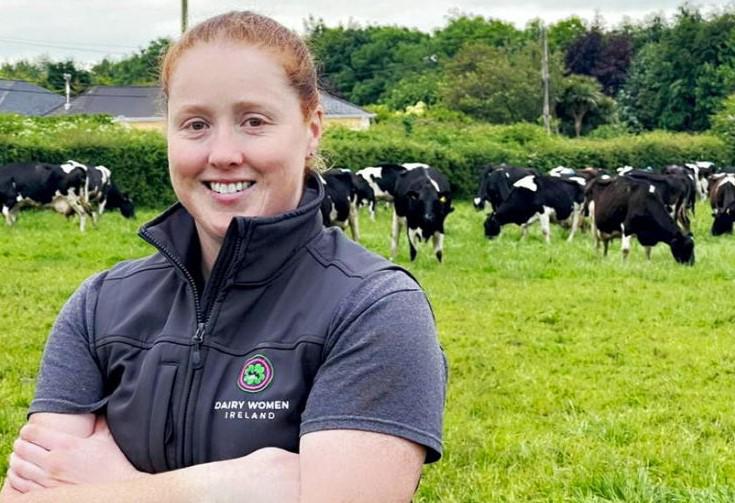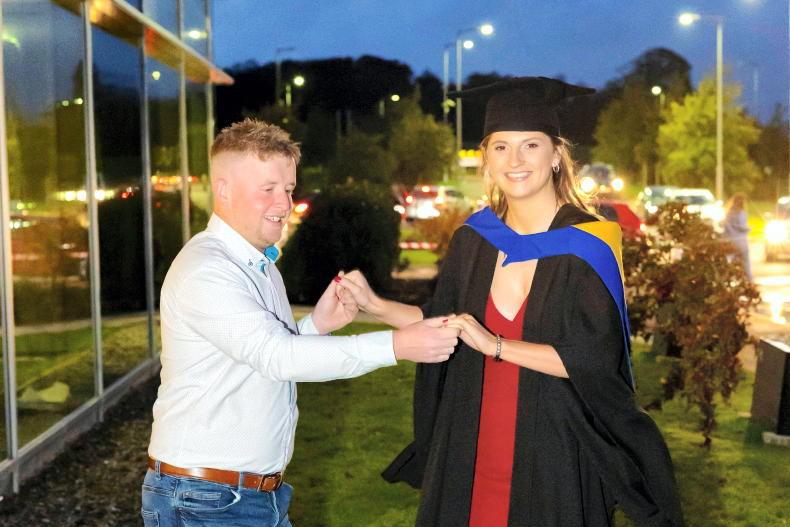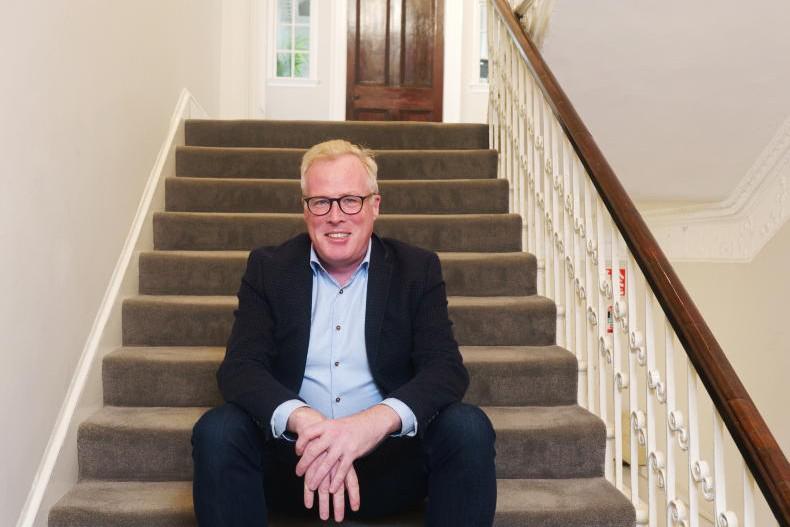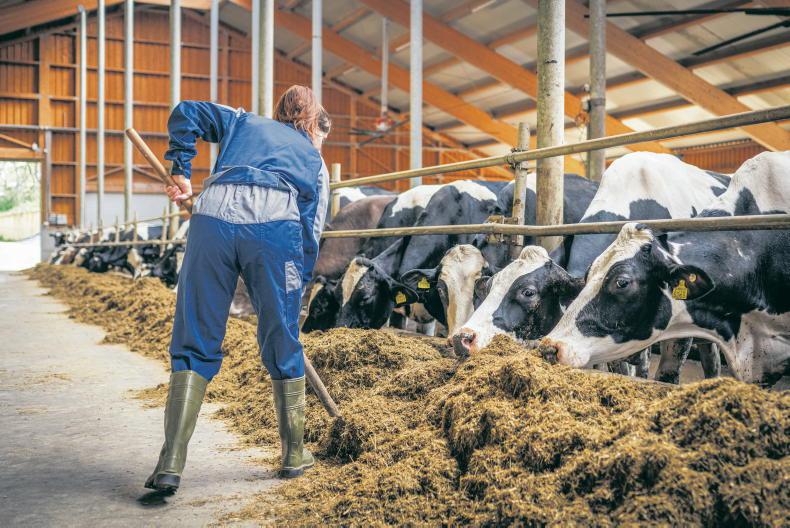Farm succession has long been an issue for families across the country, but a recent workshop on the topic has shone a spotlight on the need for families to consider the possibility of entrusting more daughters with farm inheritance.
The event, held a day before this year’s Women & Agriculture conference in Kilkenny, saw over 30 women attend a panel discussion, where a Tipperary family shared their experience of handing over a share of the farm to their eldest daughter.
Chaired by Irish Farmers Journal news editor Amy Forde, the panel included Irish Country Living’s legal expert, solicitor Aisling Meehan, farm management specialist at Teagasc, Klara McGriskin, and dairy farmers Anne-Marie and Margaret Ryan.
Several of those who spoke at the event said there was still an expectation to leave farms to sons, but agreed that conversations needed to be had to determine who in the family was most interested in continuing to farm family land.
Speaking to Irish Country Living after the conference, Anne-Marie Ryan acknowledged her family’s experience of succession was not the norm, but proved what could be achieved if families had the tough conversations in advance of inheritance becoming an issue.
Anne-Marie farms 85 ha, with 140 spring-calving, pure-breed Holsteins alongside her father LJ, in the Golden Vale in west Tipperary.
Farming full-time
“I played with the idea of doing both my full-time job and farming back in 2013, but it wasn’t working out, so I went back to Dublin full-time, where I was working in the hospitality sector,” she explains.
“I was always thinking in the back of my mind that if I didn’t return to farm, what would happen when Mam and Dad weren’t able to continue farming. Ours is a dairy farm, so the plan was for them to move into dry stock and tip away at that for as long as they could.
“But I always had an interest in the farm, I was out topping fields in the days before I sat the Junior Cert, so it was there from an early age. By 2018, I wanted to get out of hospitality and I came home with the idea of trying farming full-time, to see how it would work.
“That summer was particularly hard with the drought, so maybe I just landed at the right time to give Dad a hand, but neither he nor Mam ever wanted to push any of us into farming.

Anne Marie Ryan, a dairy farmer from Co Tipperary has taken on her family farm following a successful succession process with her parents LJ and Margaret Ryan.
"We agreed to a 12-month trial run, with no pressure on either side and once that had passed, the next conversation was getting the green cert done. That first year was nice and steady, I even had a day and a half off every week, which of course is long gone.”
Anne-Marie has two younger sisters and the family had several discussions to determine if either of them had any interest in taking on the farm.
“Mam and Dad set up a company for the farm back in 2015, which I now have a 50% share in, but the girls had no interest in farming and were happy with the arrangement. They’re far better off than I’ll ever be, as they work outside the farm, but this is the choice I’ve made and I’m very happy,” she says.
“I count myself very lucky, as the work is split down the middle with Dad and in the last two years I’ve really found my flow on the farm.”
Equal opportunities
Anne-Marie said that as more and more women pursue careers in the agricultural industry, it stands to reason that they should have the same opportunities as men when it comes to farm succession.
“I went to a convent school, so ag science wasn’t offered back when I was doing the Leaving Cert, but the girls coming through school and college now are far more advanced in their knowledge of the industry,” she says.
“Yet the older generation continues to struggle with the idea of a woman taking on a farm, mainly because of fears that the family name won’t continue on.
“If a daughter is willing to put her life into a farm, to do all the work and take that on, over a son who doesn’t want it and ends up running it into the ground, then which is the better outcome?
“Parents need to ask their children who wants the farm, because giving it to someone who doesn’t want it puts pressure on that person and ultimately can affect their health and wellbeing. I am very lucky in that I’m now farming for me, and my dad is farming for me and my future.”
Anne-Marie’s mother, Margaret spoke during the succession workshop and said it was a great comfort to her and her husband LJ that Anne-Marie had chosen farming as a career.
She says, “We were really happy she came back on her own accord, we never put any pressure on any of the girls to go into farming, but Anne-Marie was always the one most likely, as she’d shown the most interest growing up.
“We made the decision in 2015 to set up a company for the farm, which made things more straightforward when Anne-Marie took the decision to come back and take up farming full-time.
The older generation continues to struggle with the idea of a woman taking on a farm mainly because of fears that the family name won’t continue
"If we hadn’t put those things in place, and if Anne-Marie hadn’t decided to pursue a farming career, it would have made things a lot harder when we are gone, as it would have caused a lot of conflict, so we are lucky in that sense that things are sorted now.”
Solicitor Aisling Meehan urged farmers to get their affairs in order, starting with an up-to-date will, and said the most progressive way of dealing with succession was to have conversations on the subject with their children sooner rather than later.
“I would encourage people to have the conversation with their children when they are planning their will, to gauge their reaction as to what you want to do in terms of inheritance,” she said.
“The main thing you want to achieve from succession is no conflict, so the earlier you have the conversation, the more likely it is to go the way you want it to.
Klara McGriskin said that while she is seeing a change in terms of succession involving daughters, it remains predominantly sons who take on the family farm.
“I am definitely seeing a change, but I’m not sure how significant it is as 80% of succession involves sons,” she said. “I have had verbal abuse from clients when I suggest a daughter could take over the farm. But I have nothing to lose, so I will say what they don’t want to hear.
"I usually get feedback acknowledging that when they went away and thought about what I had said, they saw the benefits.
"We are getting a little bit better, but we aren’t where we need to be, as the two big things are still ‘what will the neighbours say?’ and the whole issue of the family farm name being lost. We definitely need a cultural change on this.”
Farm succession has long been an issue for families across the country, but a recent workshop on the topic has shone a spotlight on the need for families to consider the possibility of entrusting more daughters with farm inheritance.
The event, held a day before this year’s Women & Agriculture conference in Kilkenny, saw over 30 women attend a panel discussion, where a Tipperary family shared their experience of handing over a share of the farm to their eldest daughter.
Chaired by Irish Farmers Journal news editor Amy Forde, the panel included Irish Country Living’s legal expert, solicitor Aisling Meehan, farm management specialist at Teagasc, Klara McGriskin, and dairy farmers Anne-Marie and Margaret Ryan.
Several of those who spoke at the event said there was still an expectation to leave farms to sons, but agreed that conversations needed to be had to determine who in the family was most interested in continuing to farm family land.
Speaking to Irish Country Living after the conference, Anne-Marie Ryan acknowledged her family’s experience of succession was not the norm, but proved what could be achieved if families had the tough conversations in advance of inheritance becoming an issue.
Anne-Marie farms 85 ha, with 140 spring-calving, pure-breed Holsteins alongside her father LJ, in the Golden Vale in west Tipperary.
Farming full-time
“I played with the idea of doing both my full-time job and farming back in 2013, but it wasn’t working out, so I went back to Dublin full-time, where I was working in the hospitality sector,” she explains.
“I was always thinking in the back of my mind that if I didn’t return to farm, what would happen when Mam and Dad weren’t able to continue farming. Ours is a dairy farm, so the plan was for them to move into dry stock and tip away at that for as long as they could.
“But I always had an interest in the farm, I was out topping fields in the days before I sat the Junior Cert, so it was there from an early age. By 2018, I wanted to get out of hospitality and I came home with the idea of trying farming full-time, to see how it would work.
“That summer was particularly hard with the drought, so maybe I just landed at the right time to give Dad a hand, but neither he nor Mam ever wanted to push any of us into farming.

Anne Marie Ryan, a dairy farmer from Co Tipperary has taken on her family farm following a successful succession process with her parents LJ and Margaret Ryan.
"We agreed to a 12-month trial run, with no pressure on either side and once that had passed, the next conversation was getting the green cert done. That first year was nice and steady, I even had a day and a half off every week, which of course is long gone.”
Anne-Marie has two younger sisters and the family had several discussions to determine if either of them had any interest in taking on the farm.
“Mam and Dad set up a company for the farm back in 2015, which I now have a 50% share in, but the girls had no interest in farming and were happy with the arrangement. They’re far better off than I’ll ever be, as they work outside the farm, but this is the choice I’ve made and I’m very happy,” she says.
“I count myself very lucky, as the work is split down the middle with Dad and in the last two years I’ve really found my flow on the farm.”
Equal opportunities
Anne-Marie said that as more and more women pursue careers in the agricultural industry, it stands to reason that they should have the same opportunities as men when it comes to farm succession.
“I went to a convent school, so ag science wasn’t offered back when I was doing the Leaving Cert, but the girls coming through school and college now are far more advanced in their knowledge of the industry,” she says.
“Yet the older generation continues to struggle with the idea of a woman taking on a farm, mainly because of fears that the family name won’t continue on.
“If a daughter is willing to put her life into a farm, to do all the work and take that on, over a son who doesn’t want it and ends up running it into the ground, then which is the better outcome?
“Parents need to ask their children who wants the farm, because giving it to someone who doesn’t want it puts pressure on that person and ultimately can affect their health and wellbeing. I am very lucky in that I’m now farming for me, and my dad is farming for me and my future.”
Anne-Marie’s mother, Margaret spoke during the succession workshop and said it was a great comfort to her and her husband LJ that Anne-Marie had chosen farming as a career.
She says, “We were really happy she came back on her own accord, we never put any pressure on any of the girls to go into farming, but Anne-Marie was always the one most likely, as she’d shown the most interest growing up.
“We made the decision in 2015 to set up a company for the farm, which made things more straightforward when Anne-Marie took the decision to come back and take up farming full-time.
The older generation continues to struggle with the idea of a woman taking on a farm mainly because of fears that the family name won’t continue
"If we hadn’t put those things in place, and if Anne-Marie hadn’t decided to pursue a farming career, it would have made things a lot harder when we are gone, as it would have caused a lot of conflict, so we are lucky in that sense that things are sorted now.”
Solicitor Aisling Meehan urged farmers to get their affairs in order, starting with an up-to-date will, and said the most progressive way of dealing with succession was to have conversations on the subject with their children sooner rather than later.
“I would encourage people to have the conversation with their children when they are planning their will, to gauge their reaction as to what you want to do in terms of inheritance,” she said.
“The main thing you want to achieve from succession is no conflict, so the earlier you have the conversation, the more likely it is to go the way you want it to.
Klara McGriskin said that while she is seeing a change in terms of succession involving daughters, it remains predominantly sons who take on the family farm.
“I am definitely seeing a change, but I’m not sure how significant it is as 80% of succession involves sons,” she said. “I have had verbal abuse from clients when I suggest a daughter could take over the farm. But I have nothing to lose, so I will say what they don’t want to hear.
"I usually get feedback acknowledging that when they went away and thought about what I had said, they saw the benefits.
"We are getting a little bit better, but we aren’t where we need to be, as the two big things are still ‘what will the neighbours say?’ and the whole issue of the family farm name being lost. We definitely need a cultural change on this.”









SHARING OPTIONS